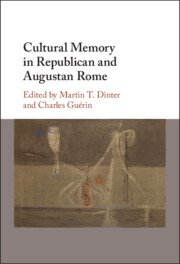Book contents
- Cultural Memory in Republican and Augustan Rome
- Cultural Memory in Republican and Augustan Rome
- Copyright page
- Contents
- Figures
- Contributors
- Acknowledgements
- Chapter 1 Introduction: What is Cultural Memory?
- Part I Writing Cultural Memory
- Part II Politicising Cultural Memory
- Chapter 10 Sulla’s Dictatorship Rei Publicae Constituendae and Roman Republican Cultural Memory
- Chapter 11 Remembering Differently: The Exemplarity ofPopulares as a Site of Ideological Contest in Late Republican Oratory
- Chapter 12 Cultural Memory and Political Change in the Public Speech of the Late Roman Republic
- Chapter 13 Remembering M. Brutus: From Mixed and Hostile Perspectives
- Chapter 14 The Making of an Exemplum: Cato’s Road to Uticensis in Roman Cultural Memory
- Part III Building Cultural Memory
- Part IV Locating Cultural Memory
- Bibliography
- Index Locorum
- Index
Chapter 11 - Remembering Differently: The Exemplarity ofPopulares as a Site of Ideological Contest in Late Republican Oratory
from Part II - Politicising Cultural Memory
Published online by Cambridge University Press: 27 April 2023
- Cultural Memory in Republican and Augustan Rome
- Cultural Memory in Republican and Augustan Rome
- Copyright page
- Contents
- Figures
- Contributors
- Acknowledgements
- Chapter 1 Introduction: What is Cultural Memory?
- Part I Writing Cultural Memory
- Part II Politicising Cultural Memory
- Chapter 10 Sulla’s Dictatorship Rei Publicae Constituendae and Roman Republican Cultural Memory
- Chapter 11 Remembering Differently: The Exemplarity ofPopulares as a Site of Ideological Contest in Late Republican Oratory
- Chapter 12 Cultural Memory and Political Change in the Public Speech of the Late Roman Republic
- Chapter 13 Remembering M. Brutus: From Mixed and Hostile Perspectives
- Chapter 14 The Making of an Exemplum: Cato’s Road to Uticensis in Roman Cultural Memory
- Part III Building Cultural Memory
- Part IV Locating Cultural Memory
- Bibliography
- Index Locorum
- Index
Summary
In Cicero’s Lucullus of 45 BC, we find a moment often ignored by scholars, in which the proponent of anti-skepticism and Antiochus’ Stoic dogmatism in the dialogue, Lucius Licinius Lucullus, draws a lengthy analogy from oratorical practice to critique one of Cicero’s arguments as the proponent of Academic skepticism. Fortunately for us, the analogy opens a rare window onto the oratorical appropriation of certain politicians as exemplary populares.1 And so Lucullus argues.
- Type
- Chapter
- Information
- Cultural Memory in Republican and Augustan Rome , pp. 183 - 202Publisher: Cambridge University PressPrint publication year: 2023

